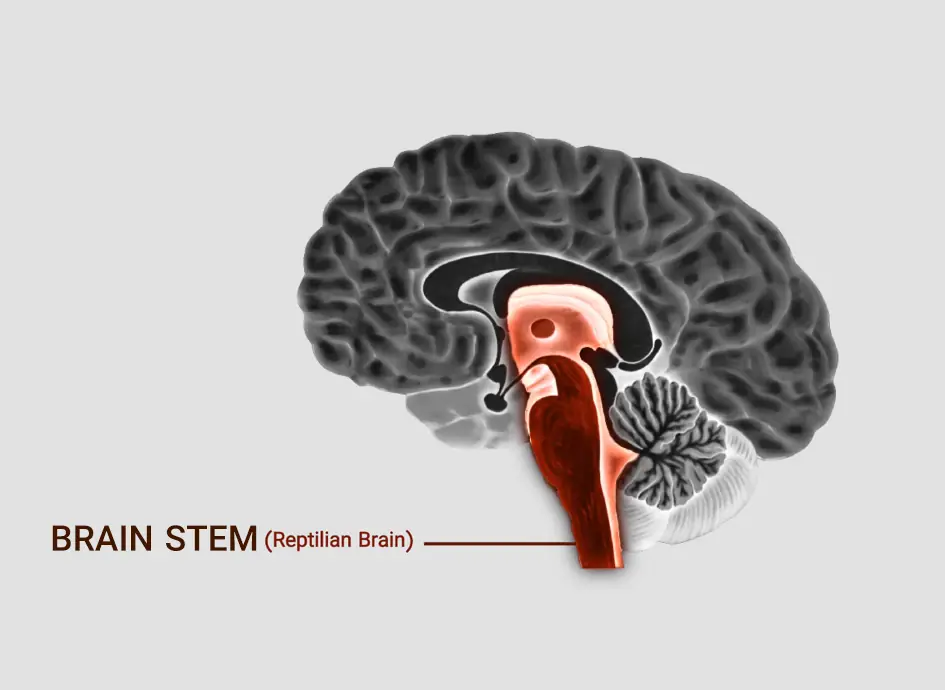Why Leaders Should not use carrot & stick as a management style although it may work?
In order to answer the above question, we need to take a look at how the brain works: Our Reptilian brain is at the forefront of all of our interactions with the outside world. This means that it takes in information from our environment in a neutral way but immediately divides it into the categories of threat or reward. This means that we are on autopilot when we are not intentionally focusing on anything, like when we start a conversation with a person and are not expecting anything negative to happen. However, any intentional or unintentional behavior on their part could put us in a #reward or threat state.
Once the Reptilian Brain perceives the behavior (words, tone, body language) of our counterpart as threat, we switch to our survival mode. As you know there is an evolutionary reason for this. We behave as if a saber-tooth tiger is about to attack us in the Savannah: We run, and this part is important, NOTHING ELSE MATTERS.
We are entirely focused on 3 things:
- the tiger i.e. the threat that our boss is using,
- how we fear it, and
- how we can survive.
So, negative emotions such as those we feel under threat drive us to narrow the range of what we are capable of doing. Note, all three subjects of focus are about getting away from the tiger. Hereby, we are not focused on any kind of evaluation of the effective ways of running away from the tiger.
Hence, we as leaders might be able to get an employee to focus on what we want through threat, but they would be operating in their survival mode and therefore limited to a reduced range of possibilities.
Remember, the reptilian brain is not very sophisticated. It knows the answer to 2X2, but not to 12X32, for this we need our cortex, our rational brain. This is because when we are negatively engaged in the Reptilian brain four of our mental functions are negatively impacted, and they start to malfunction:
- Creativity
- Perception
- Collaboration, &
- Cognition

We might not stay in that survival mode all the time, but we keep revisiting the Reptilian brain. So, we won’t have proper access to the Cortex, our executive brain, which we need for decision making, thinking and analysis, and of course creativity. As such, we won’t be able to perform our best problem-solving skills due to limited and incomplete access to the Cortex. (Creativity)
We start seeing things through a much more skeptical lens, and our negativity takes over. In other words, we now see threat when there is none, to say the least, and see threat when there is an opportunity, in the worst-case scenario. As cave dwellers, we had to make sure the tiger was not lying in wait to ambush us. This skepticism could bring about the negativity. For instance, if the same boss makes us a compliment “Nice shirt, John,” we take it as a mockery. (Perception)
While obsessed with surviving a confrontation with a tiger, we certainly don’t have the nerves for teamwork, brainstorming sessions, team decision making, etc. That’s natural because we are focused on our self. (Collaboration)
Today, neuroscience has proven that the human IQ temporarily drops under stress. When you sense fear, your perception organs focus almost entirely on the threat. This causes you to narrow your attention and block out information that is irrelevant to the threat. Adrenalin floods into your blood and wraps your muscles tighter to make you faster and stronger. This means you are quicker to action, but not necessarily smarter. As a matter of fact, your IQ temporarily drops because of the adrenaline.
I am sure you have experienced this yourself firsthand. Do you remember a time when you were not able to understand a letter/email that started with “Unfortunately” just because of the impact of that very word on what you thought the letter/email would be about? Or remember a time at school where you were not able to understand a text due to stress, which you later found easy to understand when your brain was functioning again.
Now, how does reward work?
Positive emotions lead to the exact opposite result. When I was younger I lived in Germany. At high school my German friends would ask me how one would say something in Farsi. One of these Germans was particularly talented in pronouncing the Farsi words. The encouragement and motivation that me and a few other Iranians showed to this talented Germanic linguist caused him to eventually study Middle eastern languages. Without even knowing it, our encouragements and rewards prompted him to want to get more dopamine and eventually determined his future career.
Remember, the latest findings in neuroscience have proved that the recipe for peak performance is
- A difficult but manageable challenge.
- A work environment and tasks that are fun
- A laser focus without distractions such as digital ones
Conclusion:
Therefore, as a leader you might be able to get someone do something using a carrot and stick approach. However, the things you will lose are much more valuable:
- High quality of work
- Desire to work (with you)
- A trust-based relationship that you could build on as a leader .

